|
Camping Tips
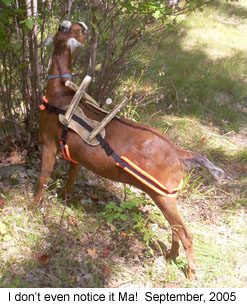
When you camp with animals there is much to think about and prepare for. How will you keep the animal in camp while you sleep? How do you keep that animal out of your food and other equipment? How do you carry in and store their food and water? What about feeding and water bowls? How do you keep them away from the human food preparations? What about wildlife at night? What if it rains? Do they need extra food when camping? Do I need a tent for the animals too? Where do I store the animals packs overnight? Does my dog need to be chained down for the night?
Soon, very soon, this page will have more training tips and ideas as well as more ideas and tips for camping and for camping with goats. How to bed them down, where to store their food and more. But for now, here are a few tips.
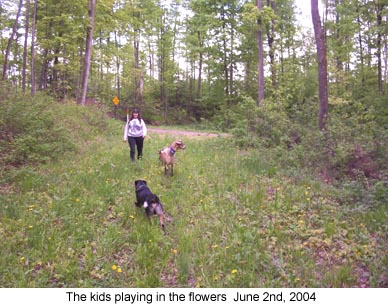
Training begins at home. You should not only have your goat trained to carry a pack but also to respect humans and their property. Usually, if you bring up or raise your own goat and work with it as it grows, the goat will have learned manners.
Your goat needs to know, notice that says needs to know, the word NO. How do you teach your goat no? When you goat is doing something you do not want it to do, or if it is on something it should not be on, or if it is stealing food, say "No" and mean no. Back up your words with moving the animal away from what it is doing. You might need to have a spray bottle or a squirt gun filled with water....yes, goats, like dogs, do not like to be sprayed in the face and will learn quickly to move away with a squirt.
No means no and it means no each and every time the same behavior is displayed. In other words, every time the goat misbehaves it needs to be corrected. It is not ok for a goat once, twice, three times and not on the fourth...or worse, no follow through by you to correct the bad behavior, each and every time.
People make the mistake of thinking a misbehavior is cute in a young animal, but when the animal is older and in fact bigger, that misbehavior is no longer ok. This is unfair training to the animal. If you baby goat, kid, jumps on you, correct it each and every time. You will not want a 150 - 200 pound goat jumping up on you.
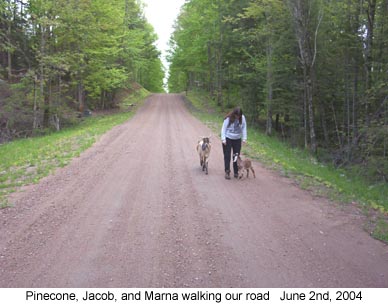
There is nothing wrong with training your goats with treats. Just teach them not to jump on you or to be pushy to get them. Teach your goat you will give the treat when you decide to give the treat. Do not let your goat get pushy and then reward that pushiness with a treat from you. That is rewarding bad behavior and your goat will not know the difference between that and pleasing you to receive a treat.
Your goat must also know the word BACK. Back means to back up away from where ever it is. Mostly "back" means to back up off people. Most of the time if you train your goat "back" by taking a step forward as you give the command, the goat will be forced gently to back up. It is a really good idea, once the goat learns to back up with you standing in front of it, to teach the goat to back up with you standing in different positions. To start, move to the side of your goat to teach this. Work up to having the goat back up from where it is standing when you give the command from a distance, and or behind it. This is especially appreciated training if you decide to wagon or cart train your goats.
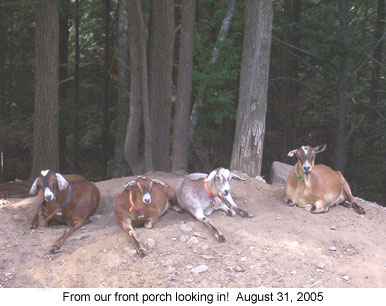
Do Not feed you goat people food when out for a day trip and stop for lunch or when camping on the trail. If you start feeding your goat people food it will not only be quite a pest in camp but will also try to get into the people food at every opportunity.
Keep you goat away from any fires in camp. It can get burned or cause humans to get burned or even start a forest fire. If a goat walks through a campfire they can get hurt. Watch you goat when the fire burns out, it may try to roll in the ashes and the ashes may and will likely have coals burning in it.
Your rules with the goat should be the same no matter where you are. Day trips should have the same rules and a week long trip. Actually, rules at home should be enforced consistently so that the goat is comfortable with how to act on the trail.
It is a great idea to take your goat on several short day hikes before every taking it on overnight trips. This way it can not only build stamina but learn some of the rules before you and the goat are tired from packing all day.
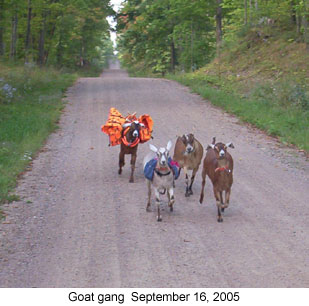
It is a very good idea to have a consistent schedule when you get to the destination with your goats. Take your goat's pack off, give your goat a treat, water the goat a bit, brush out your goat's coat, then move on to your own gear, such as your tent, campfire, etc. This way the goat feels as if it received attention and reward from you when it got to camp.
Do not feed your goat a meal as soon as you get to camp. Let the goat relax an hour or so and let it look around the camp. It will enjoy the meal more and it will last longer in it's belly overnight. You might even feed right before you sit down to your own meal (feed you goats away from the people area that is).
If you have more then one goat with you, always care for your animals in the same order. Goat's respect order. Usually each new goat added to the string should come after the rest you have trained. But, what I am saying is, take off the pack of the first through the last, then treat the first through the last, then groom first through the last. You could never expect the string to stand and wait while you do all things per goat.
more to come
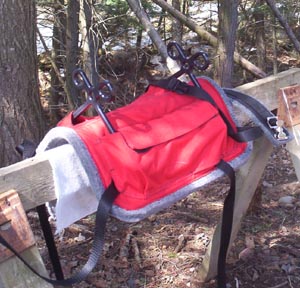
Take care of your packs. Any sawbuck or sawbuck type saddle needs a safe place so that it does not get stepped on and broken while off the goat's back. If there are tree branches to hand it from (set it across) all the better. If not be sure to put the entire saddle as well as packs inside a tent. Any day packs or soft sided packs need to be emptied of food and either kept in a tent or hung over a branch as well. Soft sided packs can get stepped on too, they may not break, but items in them might. Also it is just a good habit to take care of your packing items.
Empty any food, including goat grain, out of your pack into bear proof containers or hung high if needed. Hanging food up high is always the best idea for any types of animals, including your goats, that might get into it when you are not looking and or sleeping.
Check you pack/panniers as you sit at the camp area. Make sure you did not get holes while out on the trail. If you find a hole, even a small one, fix it right away. A small hole can become a big hole and items might fall out as you walk down the trail.
When you get home, recheck the pack, clean it up and put it away properly so that it is ready for you when you plan your next goat packing trip.
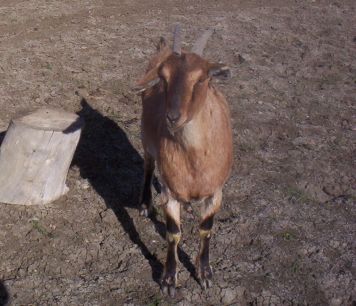
Goat fights. Goats will knock around a little bit in camp. It is best to "nip it in the bud" before it actually becomes a real goat fight. Most tiffs are just tiffs and will be over long before a human can get involved. But once in a while a couple of alpha goats will get into it. If this does happen it is best to keep them apart, if you tie down one, tie down both away from one another.
The best way to not have trouble with goats in goatpacking camp is to train your goats at home to behave, to leave your items alone and to get along with other goats, those in your own herd and with other, outside their herd, goats.
Train your goats while they are young. Work with your goats at home and on the trail before taking them on a group event.
In some campground you may have other groups not to far from you in another campsite area. Do not let your goats drift or run (the friendly devils) over to the other groups area. Even if the folks tell you it is OK for your goats to be there, do not let your goats go over. Your goats could break something of theirs, or the other folks may feed your goat things they should not have...and your goats could easily learn bad camping habits this way too.
more to come
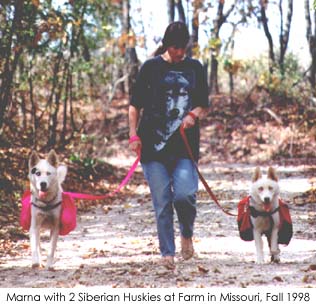
Dogs in camp and on the trail adds another dimension to the mix. Personally I do not go hiking or backpacking without my dogs (yes, that is plural). But any dogs on a packgoat trip (or any trip) need to be not only well behaved but used to being around other people's animals. A group goat packing trip is not the place for your dog to spend it's first night in camp or it's first time around other people's animals.
As you plan for the goats, you will also need to plan for the dogs. You must carry in dog food and something for the dogs to drink out of. I use two frisbies, I set those concave (top of the frisbie toward the dog's body) in my dog's pack. Not only will you use the frisbies, but thy keep the load away from poking the dog's body.
Unnecessary barking is a no. It is not ok for your dog to bark, at all, unless there is danger. Please do not take a barking dog with you on a group goat packing trip with a list of excuses for it's bad behavior. Like the goats, the dogs along need to be behaved at all times.
And do I really even need to mention that it is a bad idea to bring a dog that does not like new people? Folks that go packing with their animals do not want to have to worry about getting bitten by your dog! Again, no excuses. And yes, I have seen people bring dogs like this with them to group events.
more to come
Camp Fires. <sigh> Here's a big topic that I will touch on. Camp Fires are a big deal. If someone with you says "It's no big deal". That person needs to be watched.
I live waaaaay out on the Prairie in NW SD and wild fires can and are started by strikes of lightning, cigarette cherries blowing off the ends of cigarettes, cigarette butts that are tossed, so imagine what a camp fire can start?
If you are allowed, in the area you are packing, to build a campfire, do it right. Use extra precautions. Make sure, make positive, know, that your fire is out before you go to bed and before you leave the area.
We all know what Smokey the Bear says.....but did you know that Smokey was an actual bear cub that grew into the Spokes Bear in N WI? He was badly burned and his mother was killed in a made make or man started forest fire.
Keeping an eye and an ear on things overnight. I sleep better when I know my animals are safe. When packing we put bells on our animals (horses, llamas, dogs) at night. My goats wear bells on their collars all the time, so they have them on day and night. When I wake up and can hear a little tingle of the bells, I fall asleep again knowing all is well. If the bells all start ringing loudly and much, it is time to jump up and see what is going on. Many times, however, when you do not hear the bells ringing, all it means is that your animals are settled and fine.
It is also a good idea to put reflective tape collars, or leg wraps (made for horses can can be cut down for other size animals) so that you can shine your flashlight around the camp and see your animals are there and fine. So folks use those break and light plastic items, and if you can get them on your animals where they were stay on and safe, that would work too.
Sleeping Equipment. Oh my, this is like asking folks what their favorite type of blanket is, or how firm/soft they like the pillow, or do they have to sleep in silk pj's.... You need to take the least amount of items you will need for a good nights sleep. Items to consider...Sleeping Bag,Sleeping Pad (air pump for same if needed), Pillow or something that acts as one,Tent (and don't forget the tent pegs), pj's (if you just have to have them to sleep, your dog or other person or stuffed animal to snuggle with, Special Blanket,you get the idea. 
Remember to keep your flashlight under your pillow, check batteries before dark. You might want to wear a watch, you will probably be checking it. If you have a weapon, you will want to know right where it is in it's safe place too. Before dark also put the bells and or reflective items on your goats.
| 



 In the high plains of South Dakota, USA
In the high plains of South Dakota, USA In the high plains of South Dakota, USA
In the high plains of South Dakota, USA